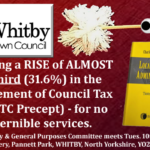Democracy? Parish the Thought!
- – an “In My View” article by NIGEL WARD, assessing the prospects of democratic representation in the absence of the second tier of local government in North Yorkshire (i.e. the abolition of Scarborough and Harrogate Borough Councils and Craven, Hambleton, Richmond, Ryedale and Selby District Councils).
~~~~~
In the aftermath of Local Government Reorganisation (LGR) in North Yorkshire, implemented on 1st April 2023, the people of North Yorkshire now find themselves with only Town and Parish Councils to mediate between ‘the common man’ and the new Unitary authority, North Yorkshire Council.
It should first be clarified that Town Councils are nothing more than Parish Councils that are empowered (by s.245(6)(b) of the Local Government Act 1972) to allow the Chair to style her/himself Mayor. The Deputy Chair may style her/himself Deputy Mayor. Many Town Mayors elect to wear, both in the Council Chamber and during civic/ceremonial events, Mayoral Regalia and Chain of Office. Big deal.
For all practical purposes, Town Councils are merely Parish Councils with delusions of grandeur. I shall hereafter refer to both collectively as Parish Councils for reasons of brevity and convenience.
My series of articles on Potto Parish Council has attracted an increasing flow of emails from readers throughout the country – from Cumbria to Cornwall and from Northumberland to Kent – expressing (often in strong language) the view that an equally diligent vivisection of their own dysfunctional Parish Councils is long overdue. That is beyond my capacity.
However, it is clear that there are many present and former Parish Councillors and Clerks/RFOs who, having seen incompetence and chicanery at close quarters, are now commiting to grasping the nettle and following my example. Now that North Yorkshire’s Districts/Boroughs have passed into history, I will be turning the searching beam of my attention to Town/Parish Councils throughout North Yorkshire – “Sunlight is the best disinfectant”.
It is often stated, with some justification, that those who seek election (or co-option) to Parish Councils do so under what is known as the SERT principle – ‘Self-Esteem Rehabilitation Therapy’ – which proposes that the opportunity to set the word ‘Councillor’ before one’s name somehow confers status as a ‘pillar of society’. The fact that very few have any insight into local government legislation, procedures and practices leads inevitably to the widely prevailing misfortune that many Parish Clerks (who are the statutory Responsible Financial Officers) tend to rule the roost, sometimes to further their own interests. Far too many Clerks/RFOs have neither qualifications nor experience to undertake such duties. Training should be compulsory, with annual refresher updates.
It is all too often the case, sad to relate, that one and the same person holds the position of Clerk to a number of small Parish Councils. Frequently, each of these operates a template web-site for which the Clerk/RFO is the webmaster – a paid service additional to the salary attached to the Clerkship. Nice work, if you can get it.
Parish Councils: What are they good for?
I was prompted to write this article by two questions posed, respectively, by a reader and a colleague. These were the questions:
Reader’s Question:
“What is the point of Parish Councils – do they really have virtually no powers?”
Colleague’s Question:
“What do Parish Councils accomplish – beyond the administration of their own affairs?”
I am unable to provide a comprehensive answer to the first question without first commenting that Parish Councils enjoy far more statutory powers than is commonly known to Parish Councillors – even to Clerks/RFOs.
Here follows a list of just some of the powers available to Parish Councils – though I must add that very few of these powers (other than those conferred under the Local Government Act 1972 – the uppermost section of the Table) ever see the light of day:

Parish Councils are often (but not always) consultees on Planning and Licensing Applications. That is to say that the principle authority (in our area, now and going forward, North Yorkshire Council) may present the Parish in which the Application is situated with an opportunity to comment.
Hitherto, when the Borough/District Councils here in North Yorkshire were the principle authorities, many Parish Councils did comment (many Councillors considered this their most important function) – and their comments, seldom untainted by a whiff of NIMBYism or self-interest, were almost invariably disregarded (usually for good reason).
I will be examining the function and purpose of Parish Councils in greater detail in future articles. Before that, I expect readers to be surprised (and perhaps shocked) by some facts and figures relating to that second question:
Colleague’s Question:
“What do Parish Councils accomplish – beyond the administration of their own affairs?”
According to the NYC website, there are 731 Parishes in North Yorkshire, serving a population of c.620,000 – an average of around 850 residents per Parish. (For comparison, there are 168 Parishes in the East Riding of Yorkshire, serving a population c.340,000 – around 2,025 residents per Parish; pro rata, roughly two-and-a-half times as many).
Not all of the North Yorkshire Parishes enjoy the benefit (or burden) of being served by a Parish Council. Some of the smallest Parishes, when adjacent to one another, may share a joint or common Parish Council. The very smallest Parishes have no Parish Council at all, but are entitled to hold an Annual Parish Meeting convened by electors. In some cases, this seldom (if ever) occurs. Collectively, around 150 of the smaller Parishes in North Yorkshire draw no Precept from the rate-paying public. The Table at the foot of this article provides greater detail.
Readers may be astonished to learn that in, recent years, Precepts (that portion of Council Tax invoices collected for Parish Councils, additional to principle Councils, Adult Services, Police and Fire & Rescue Services) for North Yorkshire’s Parish Councils amounted to a total of over £9.3 million per annum – an average of over £16,000 per Parish Council serving, on average, around 850 residents, at around £19 per annum, per capita.
In North Yorkshire, Precepts may range from a few hundred pounds per annum (for the smaller Parish Councils), up to over £500,000 per annum for the largest Town Council (Selby).
Incidentally, Ripon is permitted to style itself Ripon City Council (on account of its status as the ‘Cathedral City of the Dales’); despite the self-aggrandisement manifested in its title, Ripon is merely a Parish Council, serving around 17,000 residents – under a Precept of £410,902 (for 2022/23), costing each household c.£78 per annum.
Neither of the two largest conurbations in North Yorkshire, Scarborough and Harrogate, presently has a Town Council, though ‘the powers that be’ are pressing for their creation, much against the will of the people.
In the case of Scarborough, a recent consultation inviting the opinion of 22,000 residents of Scarborough’s central (unparished) wards on whether or not they should have a Town Council (and thereby burden ratepayers with an additional Precept of around £60-£70 per annum, per household) obtained only a derisory response of 2.45% of those eligible to take part. Only 372 (or 1.69% of those 22,000) were in favour. But it will go ahead. So much for democracy.
To offer some perspective, Whitby Town Council (WTC), which falls roughly in the middle of the Precept range, has a Precept (for 2022/23) of £233,385 (or £47.31 for every ‘Band D’ Council Tax invoice).
However, according to the WTC Annual Accounts for 2021/22, when Staffing Costs of £202,207 are deducted from that year’s Precept income (£223,435), only £21,228 remains to provide £1.61 worth of services to each of the c.13,200 residents of Whitby, where ratepayers each forked out £45.53 to meet the Precept. This adverse ratio of overheads to income would be unsustainable in any area of the commercial world.
Incidentally, even this poor return on ratepayers’ return on investment pales into insignificance in the light of Potto Parish Council, whose 2022/23 Precept of £7,500 is derived from a payment of £49.02 per ‘Band D’ household. (Cloughton Parish Council, a few miles to the north of Scarborough with well over three times the population of Potto, charges its ratepayers only £11 per annum – less than a quarter of Potto Parish Council’s Precept).
The disturbing fact is that not one of WTC’s nineteen Councillors (in fairness, the Council has recently applied to NYC for a Governance Review to reduce membership to 12-15 members) has ever recived a single vote in an election (they have all been either elected unopposed or co-opted).
This is a sad concomitant of Whitby electors’ entirely justifiable disaffection with a thorougly disengaged institution that accomplishes little or nothing for the town (beyond the Council’s own for-profit entrepreneurial/commercial ventures which, in my view, should not form any part of the democratic process). When I engage with local residents, asking what they believe is the Town Council’s most worthwhile contribution to the town, I am met with blank stares. This must change.
Returning to Question 2, whatever it is that Town and Parish Councils do manage to accomplish – beyond the administration of their own affairs – it certainly is NOT providing ‘Value for Money’.
The £9,000,000+ annually extorted from North Yorkshire ratepayers to finance Town and Parish Councils appears to me to be nothing other than a slush fund to facilitate incompetent, often pompous and frequently otherwise ineffectual fools to create a pretence of democratic representation that has become little more than a ‘self-licking lollipop’.
It is high time that most of the Parish Councils were abolished – or, at the very least, amalgamated into some sort of Rural Area Councils serving populations of, say, 12,000+ residents. In my view, every small Council should work to an independently produced Parish Plan, detailing exactly what electors require the Council to accomplish, in all aspects of its endeavours. Without that, they are stumbling along in the dark.
As for the c.32 Town Councils (I can find no precise data on this) serving urban populations of (say) 12,000+, now (in the absence of the seven District Borough Councils) is surely the time for a much closer interactive engagement with the ratepayers who are footing the bill.
To that end, I attended Whitby Town Council’s Annual Meeting on Tuesday 2nd May 2023. I was one of only three in the public gallery, one of whom was a Councillor’s spouse, the other a former Town Councillor. The membership is visibly divided into two opposing camps – roughly, the ‘old guard’ reactionaries versus the more progressive former Borough Councillors – and acrimony hung in the air like the stench of sulphur.
During Agenda Item 5 – Public Participation – I used my allotted 3 minutes (the maximum permitted) to inform members that I have attended the last few meetings of the Whitby Community Network, held at the Coliseum theatre, and was encouraged to see a regular attendance in the order of fifty or sixty members of the public asking questions and contributing information quite freely. I suggested that the Town Council would do well to emulate this level of public engagement.
To that end, I invited the new Mayor, Councillor Bob DALRYMPLE, to submit an Open Letter to the people of Whitby, for publication here on the Enquirer, extending a warm-hearted appeal to residents to attend Council meetings and express their views. Returning home, I set my invitation in writing in an email to the new Mayor.
I am much encouraged to have received the Mayor’s prompt response, accepting my invitation. I hope to see it appear on the Enquirer in the very near future.
I look forward to helping to promote what I fervently hope will be a new era of inclusive democratic representation in the town of Whitby. It is 47 miles by road from Whitby to Northallerton (the seat of North Yorkshire Council) and a nightmare journey by public transport. Few members of the public will ever attend.
Whitby Town Council is our collective voice and its primary function is to raise that voice in representation of Whitby residents. The first step is to listen to them – without which, the alternative is moribundity and eventual abolition.
North Yorkshire’s Town and Parish Council Precepts per ‘Band D’ household
(courtesy of Whitby Town Clerk, Mr Michael KING)













